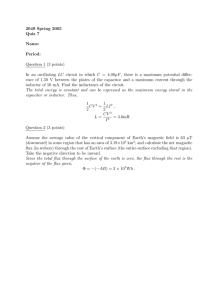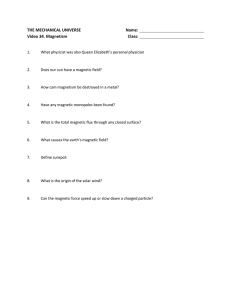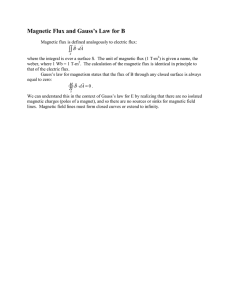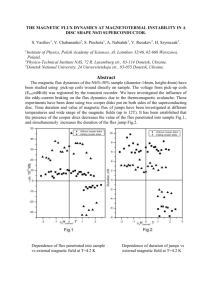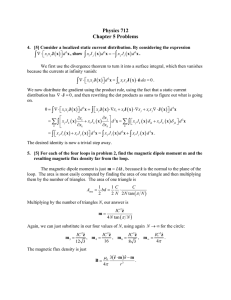Magnetism (Terms and Definitions) 1. Magnetic Flux ϕ (WEBER) a
advertisement
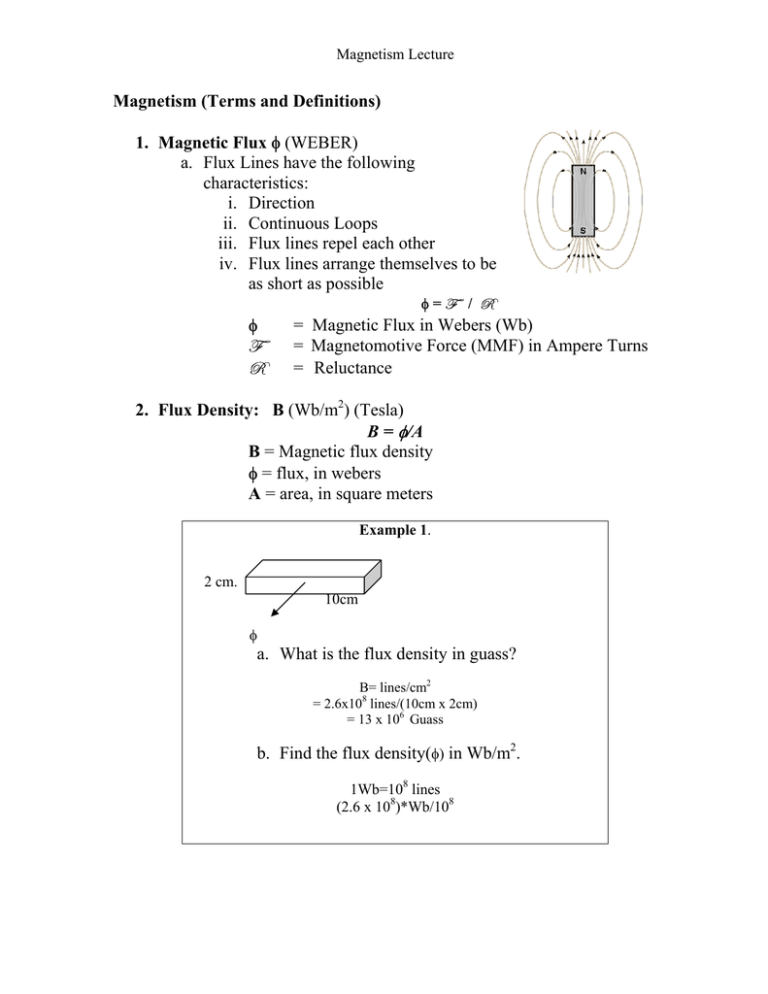
Magnetism Lecture Magnetism (Terms and Definitions) 1. Magnetic Flux φ (WEBER) a. Flux Lines have the following characteristics: i. Direction ii. Continuous Loops iii. Flux lines repel each other iv. Flux lines arrange themselves to be as short as possible φ Y e φ=Y / e = Magnetic Flux in Webers (Wb) = Magnetomotive Force (MMF) in Ampere Turns = Reluctance 2. Flux Density: B (Wb/m2) (Tesla) B = φ/A B = Magnetic flux density φ = flux, in webers A = area, in square meters Example 1. 2 cm. 10cm φ a. What is the flux density in guass? B= lines/cm2 = 2.6x108 lines/(10cm x 2cm) = 13 x 106 Guass b. Find the flux density(φ) in Wb/m2. 1Wb=108 lines (2.6 x 108)*Wb/108 Magnetism Lecture 3. Permeability: µ (measured in weber/ampere-turn-meter) Definition: The ease with which flux lines may be established within a material. It is represented by the Greek letter µ or noted as (Webers/Amp-meter). The amount of flux density (B) that will occur for a given magnetic field intensity (H). µ = B/H µ B H = Permeability of a material = Flux Density = Magnetic Field Intensity 4. Relative Permeability: µrelative Definition: the ratio of its absolute permeability (µ) to the permeability of a vacumn (µ0) µrelative =µ/µ0 -7 µ0 = 4πx10 Wb/A-m. Permeability of a vacuum 5. Magnetomotive Force: Y (MMF) Definition: The amount of force produced by means of current carrying conductive coil. Y = N*I = Ampere Turns Y = Magnetomotive force, in ampere-turns N = Number of turns of a conductor I = Current through the N turns 6. Magnetic Field Intensity: H (measured in Ampere turns per meter) H= Y /l = NI/l H = Magnetic Field Intensity Y = Magnetomotive Force (Ampere turns) l = average length of path (in meters) 7. Reluctance e (synonymous with Resistance in an electric circuit) Definition: The opposition to the establishment of a magnetic field in a material e = l/ µA e = Reluctance l = average length of path (in meters) µ = Permeability of material A = Area in m2 Magnetism Lecture Current’s Relationship to magnetism Right Hand Rule (illustration) As current flows through a conductor the direction of the magnetic field can be determined by use of the Right Hand Rule. Wrap your right hand around the conductor as shown with your thumb pointing in the direction of electron flow. Your fingers will illustrate the direction of the magnetic field(B). Magnetism Lecture Flux Density of a Coil Current carrying conductors configured as above can increase the Flux Density of a magnetic field. Inductors L = N2µA/l Henrys’s N = number of turns µ = Core permeability A = Cross-sectional area of core, in square meters l = average length of core, in meters
